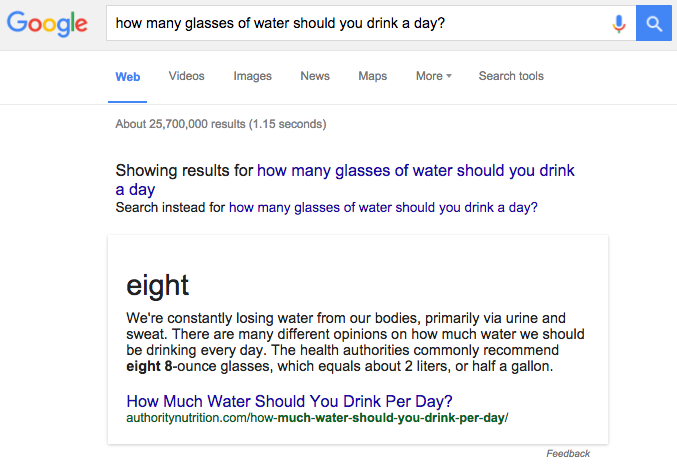How Much Water You Really Need Every Day

By:
How many glasses of water do you need to drink each day to stay healthy and avoid dehydration? If you're like most people, you've probably heard that it takes eight.
RELATED: These 11 Major Water Brands Are All Owned by the Same Company
What you probably don't know is that advice is dead wrong. Eight glasses a day is the "myth that will not die," health services researcher Aaron Carroll wrote, and there is "no science behind it."
The origin of this myth can be traced back to a 1945 report from the Food and Nutrition Board, which said that humans need about 2.5 liters (or 10.5 cups) of water a day. Less well known is information in the second part of the report, which said that most of that water is "contained in prepared foods," such as fruits and vegetables. A lot of people seemed to have ignored that part.
Every year, especially around summer, you see stories about the importance of staying hydrated, and more often than not, you're advised to drink at least eight glasses of water daily to combat dehydration.
 Google - google.com
Google - google.com
"The reports you read are almost always worried about something completely different," Carroll said. "They fear that otherwise healthy adults and children are walking around dehydrated — so many that dehydration has reached epidemic proportions. Under scrutiny, however, this assertion fails to hold water." (We see what you did there.)
RELATED: What Bottled Water Companies Don't Want You To Know
A 2002 article published in the American Journal of Physiology explored the enduring myth and found that not only is there no scientific evidence supporting the "eight glasses per day" rule, but also that drinking that much water — on top of the water we consume through prepared foods and drinks — is actually bad for you, "both in precipitating potentially dangerous hyponatremia (low sodium) and exposure to pollutants and also in making many people feel guilty for not drinking enough."
What's more, there are myths that have evolved out of the eight glasses recommendation. For example, some people believe that drinks such as coffee and alcohol contribute to dehydration; that's also been proven untrue. The current scientific consensus is that "caffeinated drinks (coffee, tea, and soft drinks) should indeed count toward the daily fluid intake."
"There is no formal recommendation for a daily amount of water people need," Carroll wrote in a recent New York Times column. "That amount obviously differs by what people eat, where they live, how big they are, and what they are doing. But as people in this country live longer than ever before, and have arguably freer access to beverages than at almost any time in human history, it's just not true that we're all dehydrated."
